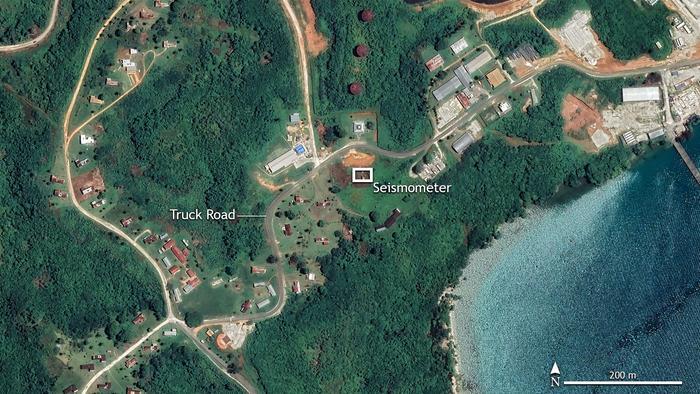A radio signal from an Earth-sized exoplanet makes a research team prick up their ears. Apparently, the planet has a magnetic field.
Boulder – Researchers usually determine whether life is possible on an exoplanet by checking whether the temperatures there are suitable for allowing liquid water on the surface. However, there are other important criteria that a habitable planet should meet. For example, a magnetic field is of great importance: it protects the planet's atmosphere from the high-energy particles and plasma that the star around which the planet orbits throws into space.
If there is no magnetic field, the atmosphere is eroded over time and disappears into space. "Whether a planet with an atmosphere survives or not may depend on whether the planet has a strong magnetic field or not," explains astrophysicist Sebastian Pineda of the University of Colorado in a statement. Together with Jackie Villadsen, an astronomer at Bucknell University, Pineda has identified an Earth-sized planet outside our solar system that may have a magnetic field. The study was published in the journal Nature Astronomy.
Alien exoplanet sends out signals – researchers suspect
YZ Ceti b is a rocky planet orbiting a star about twelve light-years from Earth. Pineda and Villadsen, while observing the planet, discovered a repetitive radio signal emanating from the star YZ Ceti. "I saw this thing that no one had seen before me," Villadsen recalls of the moment she first discovered the radio signal. "We saw the first eruption and it looked beautiful," Pineda describes, continuing, "When we saw it again, it was a clear indication that maybe we really have something here."
| Name: | YZ Ceti b |
|---|---|
| Type: | Rock exoplanet |
| Mass: | 0.7 Earth masses |
| Radius: | 0.913 Earth radii (estimated) |
| Duration of an orbit around the star: | 2 days |
| Discovery: | 2017 |
| Source: Nasa |
The research team suspects that the radio waves they have discovered are interactions between the magnetic field of the Earth-sized exoplanet and the star. Such radio waves must be very strong due to the great distance of twelve light years. So far, only Jupiter-sized exoplanets with magnetic fields have been discovered. The team had to find a new method to detect magnetic fields on Earth-like planets, because the magnetic fields are not directly visible and it is therefore difficult to find out whether a distant planet has one.
Plasma is ejected from the star into space and deflected by the exoplanet's magnetic field. The plasma then interacts with the star's magnetic field and creates radio waves – which in the case of YZ Ceti b could be detected on Earth. © Alice Kitterman/National Science Foundation
Exoplanet YZ Ceti b could have a magnetic field
Villadsen describes the technique the team used to search for the planets: "We are looking for planets that are very close to their stars and have a similar size to Earth. These planets are far too close to their stars to live on, but because they're so close, the planet plows through a pile of material coming from the star." If the planet passes through enough stellar material, "it will cause the star to emit bright radio waves," Villadsen continues.
A radio telescope listens into the universe. (Symbolic image) © imago/UIG
0
Also Read
NASA rover makes surprising discovery on Mars
READ
"Extraordinary" size – researchers find giant stars in the early universe
READ
Green fireball explodes in the sky – meteor made "basically a belly splash"
READ
Surprising turn in the universe: "Star trail" is something completely different
READ
Looking into the depths of the universe – This is how "Hubble" sees the universe
READ
Fancy a voyage of discovery?
My Area
The red dwarf star YZ Cet and the exoplanet YZ Ceti b are a perfect match for this approach: the exoplanet is very close to its star – it takes only two days to orbit it once. The resulting radio waves are so strong that they can be observed on Earth. The researchers use them, among other things, to measure how strong the planet's magnetic field is.
I saw this thing that no one has seen before me.
Jackie Villadsen
Universe: Search for potentially habitable planets continues
"The search for potentially habitable or habitable worlds in other solar systems depends in part on whether rocky, Earth-like exoplanets actually have magnetic fields," explains Joe Pesce, program director of the National Radio Astronomy Observatory at the National Science Foundation (NSF), which funded the research in part. "This research not only shows that this particular rocky exoplanet is likely to have a magnetic field, but also offers a promising method to find more."
The research team is certain that YZ Ceti b is the best candidate so far for a rocky planet with a magnetic field. "But I think there will be a lot of rework needed before a really clear confirmation of the radio waves caused by a planet comes out," Villadsen points out. Her colleague Pineda is optimistic about the future: "There are many new radio systems that are being put into operation or are planned for the future. Once we have shown that this is really happening, we can approach it more systematically. We are still at the very beginning." (tab)
This article was created with the help of machines and carefully reviewed by editor Tanja Banner before publication.













